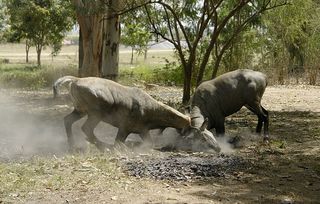
Nilgai
Order : Artiodactyla
Family : Bovidae
Subfamily : Bovinae
Species : Boselaphus tragocamelus
Keywords: blue
Which zoos have them?
Artis (Netherlands)The Nilgai is listed as Least Concern. Does not qualify for a more at risk category. Widespread and abundant taxa are included in this category, on the IUCN Red List of Threatened Species
Nilgai habitats
Forest, Grassland, Shrubland, Subtropical / Tropical Dry forest, Subtropical / Tropical Dry Grassland and Subtropical / Tropical Dry ShrublandSome facts about the
Nilgai
Adult weight : 180 kg (396 lbs)
Maximum longevity : 22 years
Female maturity :815 days
Gestation : 255 days
Litter size : 2
Litters per year : 1
Interval between litters : 365 days
Weight at birth : 5.875 kg (12.925 lbs)
Facts about the nilgai
NILGAI The nilgai (Boselaphus tragocamelus) is a large, Indian antelope.
Neel Gai The Indian bluebuck, or nilgai, Boselaphus tragocamelus is the largest of all Asiatic antelopes. (Full text)
Sloth bear (Ursus mekursus) are found in some areas and a small population of bluebull (Boselaphus tragocamelus) is found in southern part of the park.
Nirgai or Blue bull (boselaphus tragocamelus) is not a cow but an antelope found in Nagar Parkar and Chachro Talukas grazing on grass and browsing on trees like acacia arabica, prosopis spicigera and zizyphus jujaba (ber) and its fruit. (Full text)
The Indian bluebuck, or nilgai, Boselaphus tragocamelus is the largest of all Asiatic antelopes.
The nilgai (Boselaphus tragocamelus) is the largest Asian antelope.
The Blue Bull or Nilgai (Boselaphus tragocamelus) is the largest and most common of the 3 species of antelope and gazelle found here.
The nilgai (blue bull) (Boselaphus tragocamelus) is found in most parts of the district.
And since a nilgai is so much bigger then an axis I think it would be safe to say the nilgai cape would be worth more then an axis cape. (Full text)
- antelope eland nilgai antelope nilgai is advisor becoming financial requirement
- alga lettuce sea antelope nilgai is financial service ubs
Native to eastern Pakistan and India, nilgais are generally forest dwellers, though they are sometimes found on open plains.
net )Hey John, Nilgais are pretty cool animals ain't they ?
Apart from Tigers, Elephants, Leopards / Panthers, Jungle cats, Fishing Cats, Leopard cats, Himalayan black bears, Sloth bears, Jackals, Martens, Dholes, Civets, Mongooses, Otters, Hares, Porcupines, Chital (spotted deer), Sambar deer, Hog deer, Barking deer, Ghorals, Wild Boars, Pangolins, Macaques, Langurs and Blue Bulls (Nilgais) are some of the species which are found here.
Apart from Tigers, Elephants, Leopards / Panthers, Jungle cats, Fishing Cats, Leopard cats, Himalayan black bears, Sloth bears, Deers, Hog deer, Barking deer, Ghorals, Wild Boars, Pangolins, Jackals, Martens, Dholes, Civets, Mongooses, Otters, Hares, Porcupines, Chital (spotted deer), Sambar deer, Macaques, Langurs and Blue Bulls (Nilgais) are some of the species which are found here. (Full text)
"Usually baby nilgais are kept covered in the grass by their mothers who are always around to protect them.
Nilgais play havoc with crops DERA BASSI, Dec 24 — Herd of nilgais are playing havoc with crops in the surrounding villages for the past couple of months forcing villagers to spend sleepless nights in the fields. (Full text)
DERA BASSI, Dec 24 — Herd of nilgais are playing havoc with crops in the surrounding villages for the past couple of months forcing villagers to spend sleepless nights in the fields. (Full text)
More animals beginning with N
